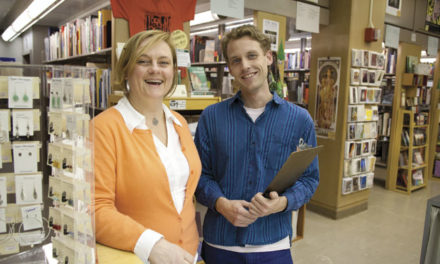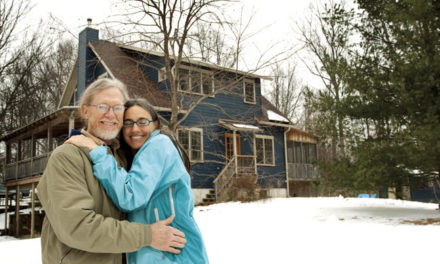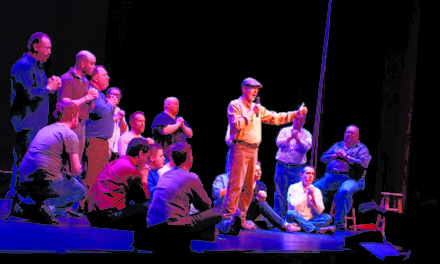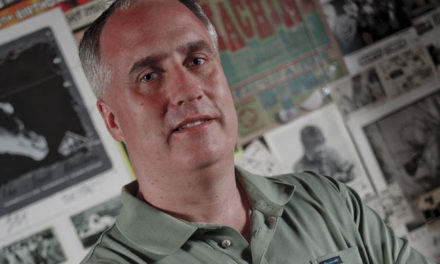by TRACY ZOLLINGER TURNER
As large group gatherings remain unsafe for the foreseeable future, performing arts companies across the country have shut down—even Broadway theaters are dark at least until the summer.
Locally, Bloomington theater companies are innovating ways to keep audiences engaged while working together in the spirit of collaboration.
“We all have each others’ numbers and we’re all working together all the time
to figure out the best way forward,” says Bloomington Playwrights Project Managing Director Brad Schiesser. “We all do different things and none of us wants to see the others fail.”
Most of Bloomington’s theater companies say they were financially healthy when the COVID-19 pandemic hit, and that they have been able to pivot programming and adapt for the 2020–21 season. But if the pandemic continues to restrict the public’s ability
to gather beyond that point, their futures become more uncertain. The unknown fate of the John Waldron Arts Center, which provides an affordable place for local theater companies to perform in its two theater spaces, seriously deepens that uncertainty.
The Future of the Waldron

In May, Ivy Tech Community College– Bloomington announced it was passing ownership of the John Waldron Arts Center back to the City of Bloomington. According to Sean Starowitz, assistant director for the arts at the City’s Economic & Sustainable Development Department, the official transfer of the building will likely happen on January 1, and the decision about its future will be shepherded by a task force appointed by the mayor and co-chaired by Miah Michaelsen, deputy director of the Indiana Arts Commission, and Valerie Peña, assistant vice president and chief of staff for the Office of Governmental Relations and Economic Engagement at Indiana University.
For now, Starowitz says the City’s plan for 2021 is to “maintain minimal but critical use for the livelihood of arts organizations,” such as Cardinal Stage, Stages Bloomington, and the Jewish Theatre of Bloomington. Feasibility studies and future use plans for the facility won’t be completed and presented to the public until much later in the year.
Cardinal Stage
It was a stroke of luck that Cardinal Stage sold its building on South Walnut in the spring, says Managing Director Gabe Gloden. Combining office space with the Bloomington Academy of Film and Theater allowed Cardinal to significantly reduce overhead costs. Funding from the coronavirus relief bill and the willingness of many season ticket holders to donate what they had paid for canceled productions also helped Cardinal remain stable.

Gloden says that figuring out how to drum up revenue in the digital realm has been a challenge, especially with so much free content hitting the internet. “Digital content creation and rollout is essential … but this industry has really struggled to figure out how to monetize things,” he says. “So, we at Cardinal thought, ‘Well, maybe this is an opportunity for us to counter-program. … Maybe people are going to be spending so much time in front of the screens that they’re going to be looking for opportunities to step away from them and interact with theater in a new way, possibly outside.’”
Dubbing its 2020–21 lineup the “season of artistic adventure,” Cardinal has developed a “walkabout radio play” series that invites participants to walk among local landmarks as they listen to a story unfold. “The response has been really positive,” says Gloden. “The challenge has been getting people to completely rethink the way theater is created and delivered and enjoyed.”
To that end, Cardinal created the Cardinal Cabaret Series, an interactive series of streamed performances (Home for the Holidays, December 11,12, 18, 19; Swing into Spring, March 26–27; and Vintage Broadway, May 7–8) hosted by different teams of local artists and guests from past productions. Cardinal is also offering a virtual performance of the musical Ordinary Days, which will be presented on demand.
Cardinal is presenting a membership- based program that gives ticketholders access to all of the season’s digital content for $100. “We’re going to overdeliver, I think, in terms of the value that the members are going to receive,” says Gloden. “I definitely tell people, when they ask the best way to support us, to purchase a membership and take a chance.”
cardinalstage.org /support
Bloomington Playwrights Project

As the pandemic hit, the Bloomington Playwrights Project was enjoying the fact that its subscriber base had “septupled in the last six or seven years,” according to Brad Schiesser, its managing director. And the independent nature of the organization made it much easier to pivot to online programming than it was for others that had to negotiate the rights to perform online. “We have this entire backlog of new work that is held in rights by the writer, including archival footage of a whole bunch of shows from the last ten years,” says Schiesser. This allowed BPP to create its own streaming, on-demand service as a fundraiser early on as it procured a Payroll Protection Program loan to help weather the storm.
As the coronavirus receded and resurged, “we’ve been through 10 to 12 possible iterations of our 2020–21 season,” says Schiesser. Without the clear view that even a half-sold house would be safe for live performance, Producing Artistic Director Chad Rabinovitz conceptualized a new, at-home kind of show called In the Box Entertainment. Performances happen in real time online, but audience members are sent an interactive mystery box in advance that has items they may use, wear, smell, hold, or taste during the performance.
BPP writers continue to create new productions in this genre, and, because it owns its own performance space, BPP will continue to evaluate live performance possibilities. “We’re writing for the time we are in,” says Schiesser. “We are still running, we’re still on-brand with our mission: paying artists to create new content.”
newplays.org
Jewish Theatre of Bloomington
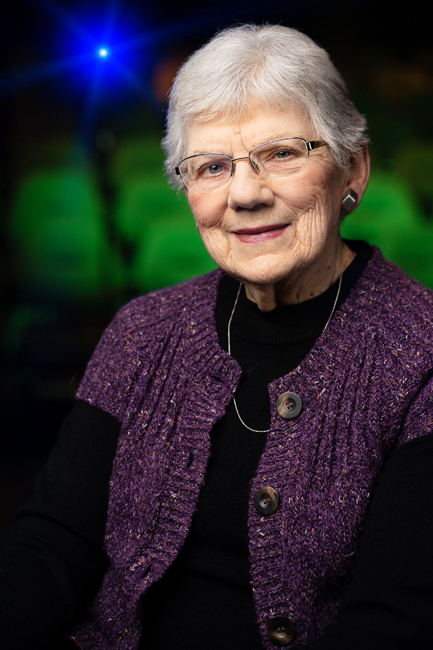
The Jewish Theatre of Bloomington (JTB) celebrated its 15th anniversary “right before everything went kablooey and shut down,” says Producing Artistic Director Audrey Heller. After canceling their spring production of The Wanderers, “we sat on our haunches for a good month, not really knowing what to do,” she says.
As a return to the stage appeared increasingly unlikely, the JTB began to investigate the possibilities of Zoom- appropriate productions, landing on The Grandkid—a lighthearted script by John Lazarus about a grandfather and granddaughter who become roommates as she begins college at the university where he teaches. A staged reading was presented to online audiences as a free gift in August, with
an invitation to donate.
The Grandkid allowed access to an audience from all over the United States and beyond, says Heller. “We don’t want to go dark,” she adds. “That’s the kiss of death.”
While the wait for safe social gatherings continues, the JTB plans to do a reading of Blessings From the Pandemic, a Poetry Cycle for Performance by poet Rich Orloff in January. Heller is also looking for another intimate script that would lend itself to the Zoom format to produce in the spring and hopes that they will be back in live business— with a stage to play on—by autumn 2021.
jewishtheatrebloomington.com
Indiana University Theatre
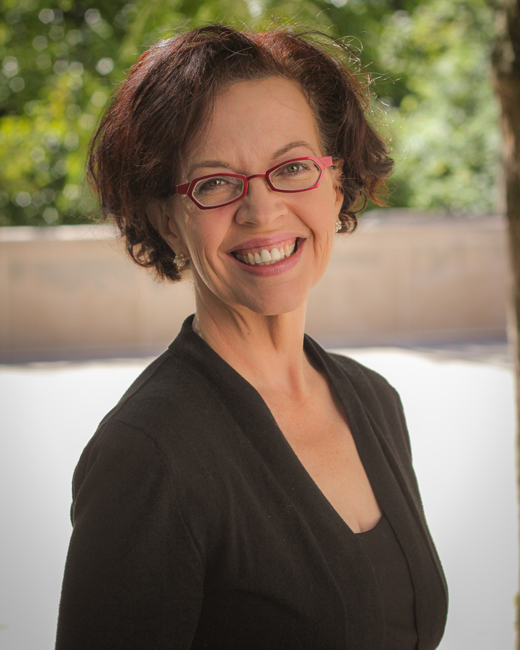
“We have a two-part mission this year,” says Linda Pisano, chairperson of the Indiana University Department of Theatre, Drama, and Contemporary Dance. “The first is to engage audiences with interesting work, even if it’s not live, and the second is to address race and the issues of our times.”
With campus theaters currently being used as classrooms, theater classes have moved online, where teams of students work together on theoretical productions that are being presented to the public virtually, free of charge. Students are learning a broad range of theater production skills as a result of today’s safety requirements. “We send out green screens, cameras, and microphones to students, and their dorm rooms and apartments become private studios,” says Pisano.
In response to recent racial justice protests, the department began a series of plays by Black authors called Amplified, which will continue in February. As well, guest artists from various racial and ethnic backgrounds have been invited to contribute, including award-winning director and IU alumnus David Koté.
Pisano is optimistic about the future of theater everywhere when the pandemic subsides. “We’re going into a renaissance after this,” she says. “You can’t take this away from people for so long without coming back with a bang.”
theatre.indiana.edu
Stages Bloomington
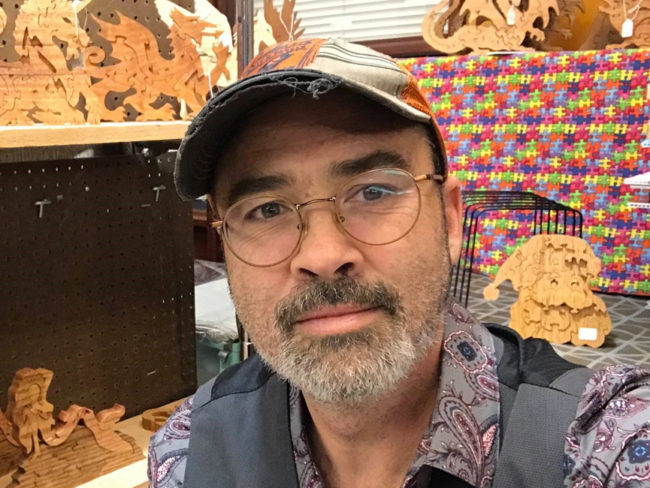
Bloomington’s volunteer-driven, youth theater education and performance company entered 2020 in a state of flux after its executive director, Pat Gleeson, died unexpectedly in November 2019. Marc Tschida, who also works as the operations and business manager for the Lotus Education and Arts Foundation, was brought on as interim director of Stages Bloomington in the spring, when the pandemic caused the cancellation of the musical The Lion King.
From that point, “we started a campaign to work on maintaining our community with our young actors,” says Tschida. Efforts were focused on social media and opportunities for youth to connect online through trivia night events and touch-in singalongs for The Lion King cast, which still hopes to perform live in 2021.
As the need to cancel summer camps relegated Stages’ 1,700-square-foot space to an expensive storage unit, “we made the tough decision to become a nomadic organization,” says Tschida. Releasing the physical space allowed Stages to focus its resources on creating virtual classes and performances. As complicated as 2020 has been, the circumstances have “given us the time to really step back and look at our programming and put ourselves in a good place as we move forward,” says Tschida.
As they round into 2021, Stages plans to turn to vaudeville, with comedy, stunt and juggling, and clowning courses leading up to a musical adaptation of the Marx Brothers’ Duck Soup.
stagesbloomington.org


